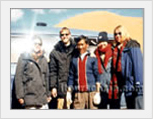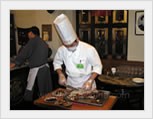
Shui People's Village Guide
-Travel to Shui People's Village In China, there are approximately 300,000 Shui people. The Shui people live in compact communities mostly in Sandu Shui Autonomous County, Libo County, Duyun City, Dushan County in Qiannan Buyiand Miao Autonomous Prefecture; in Kaili City, Liping County, Rongjiang and other small region in the west of Guangxi Zhuang Autonomous Region.The residential areas of the Shui people are located at the south side of the Miaoling Mountains and the upper reaches of the Duliu River and the Longjiang River in the southeast part of the Yun-Gui Plateau,where forests are densely covered, mountains and rivers are like pictures.They are known throughout the country as good dancers. Their most popular festive dances are the "Copper Drum Dance" and the "Lusheng Dance." They also play traditional music using several instruments, such as the huqin, drums, gongs, lusheng and others.
In China, there are approximately 300,000 Shui people. The Shui people live in compact communities mostly in Sandu Shui Autonomous County, Libo County, Duyun City, Dushan County in Qiannan Buyiand Miao Autonomous Prefecture; in Kaili City, Liping County, Rongjiang and other small region in the west of Guangxi Zhuang Autonomous Region.The residential areas of the Shui people are located at the south side of the Miaoling Mountains and the upper reaches of the Duliu River and the Longjiang River in the southeast part of the Yun-Gui Plateau,where forests are densely covered, mountains and rivers are like pictures.They are known throughout the country as good dancers. Their most popular festive dances are the "Copper Drum Dance" and the "Lusheng Dance." They also play traditional music using several instruments, such as the huqin, drums, gongs, lusheng and others.
 The Shui people are also known for making gorgeous handicrafts, such as paper cuttings, woodcarvings and embroideries. This minority usually dresses in black and blue with the women wearing collarless blue blouses, black trousers and aprons and the men wearing black turbans and long gowns. During festivals, the women will wear skirts and wear lots of silver, as well as put their hair up in a bun. As far as their food habits are concerned, the Shui people eat a lot of fish and rice, along with helpings of sweet potatoes, barley and corn. They also specialize in making a rice liquor. The Shui people are most likely descendants from the Luoyue people, an early tribe that lived before the Han Dynasty on China's southeastern coastline.
The Shui people are also known for making gorgeous handicrafts, such as paper cuttings, woodcarvings and embroideries. This minority usually dresses in black and blue with the women wearing collarless blue blouses, black trousers and aprons and the men wearing black turbans and long gowns. During festivals, the women will wear skirts and wear lots of silver, as well as put their hair up in a bun. As far as their food habits are concerned, the Shui people eat a lot of fish and rice, along with helpings of sweet potatoes, barley and corn. They also specialize in making a rice liquor. The Shui people are most likely descendants from the Luoyue people, an early tribe that lived before the Han Dynasty on China's southeastern coastline.
The Shui language belongs to the Shui language of the Zhuang and Dong language branch of the Sino-Tibetan Language Family. The ancestors of the Shui people created their own written lanuage, called "Shui" scripts. The Shui people have their own calendar, which is basically identical with the traditional Chinese calendar. However, the 8th month in the traditional Chinese lunar calendar is considered as the end of the year in the Shui calendar and the 9th month, the beginning of the year. The Shui people call the Spring Festival "Jieduan" (transliteration from the Shui language), which is celebrated grandly and lively. On the occasion all kinds of recreational activities are carried out, such as drums and gongs beating, Lusheng playing, horse racing, dancing and singing, etc..
More Attractions in Guizhou Province
Your Question & Quick Answer*We welcome and appreciate your questions & reviews
Booking Procedures | Terms & Conditions | Payment Methods | Links | Site Map | About Us | Contact Us | Travel Agent
Copyright 2008, All rights reserved.. itourbeijing.com professional china travel guide and china travel service
TEL: 86-10-85711972 (Universal) 1-888-288-9328 (North America) E-mail: contact@itourbeijng.com
Tours Index | China Tours | Beijing Tours | Xi'an Tours | Shanghai Tours | Guilin Tours | Tibet Tours
China Travel | Beijing Travel | Shanghai Travel | Xi'an Travel | Guilin Travel |Beijing Map
China Golf | Beijing Golf | Shanghai Golf | Xiamen Golf | The Great Wall Travel | Yangtze Cruise | Travel Picture



